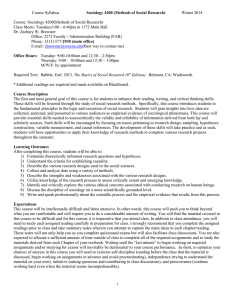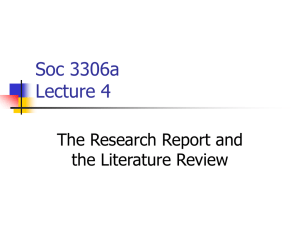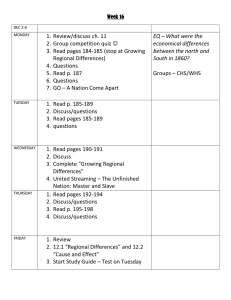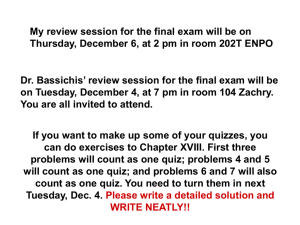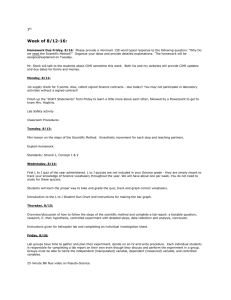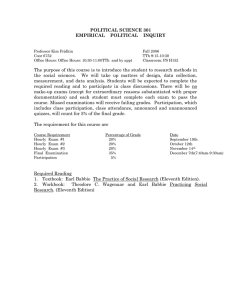Course: Sociology 4200(Methods of Social
advertisement
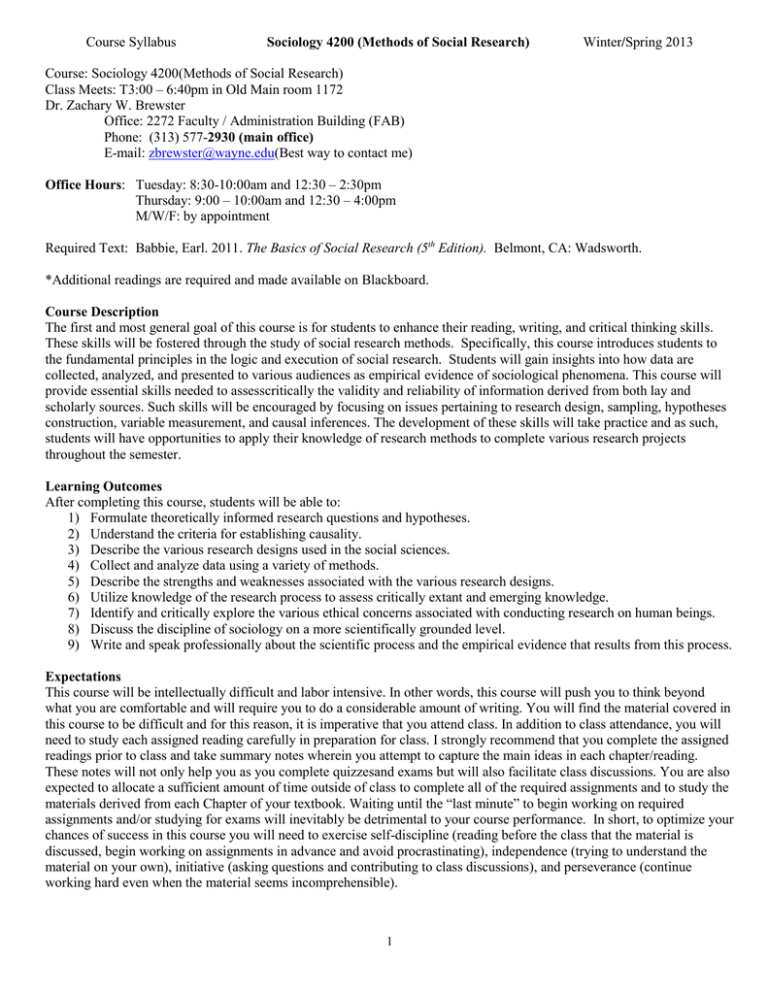
Course Syllabus Sociology 4200 (Methods of Social Research) Winter/Spring 2013 Course: Sociology 4200(Methods of Social Research) Class Meets: T3:00 – 6:40pm in Old Main room 1172 Dr. Zachary W. Brewster Office: 2272 Faculty / Administration Building (FAB) Phone: (313) 577-2930 (main office) E-mail: zbrewster@wayne.edu(Best way to contact me) Office Hours: Tuesday: 8:30-10:00am and 12:30 – 2:30pm Thursday: 9:00 – 10:00am and 12:30 – 4:00pm M/W/F: by appointment Required Text: Babbie, Earl. 2011. The Basics of Social Research (5th Edition). Belmont, CA: Wadsworth. *Additional readings are required and made available on Blackboard. Course Description The first and most general goal of this course is for students to enhance their reading, writing, and critical thinking skills. These skills will be fostered through the study of social research methods. Specifically, this course introduces students to the fundamental principles in the logic and execution of social research. Students will gain insights into how data are collected, analyzed, and presented to various audiences as empirical evidence of sociological phenomena. This course will provide essential skills needed to assesscritically the validity and reliability of information derived from both lay and scholarly sources. Such skills will be encouraged by focusing on issues pertaining to research design, sampling, hypotheses construction, variable measurement, and causal inferences. The development of these skills will take practice and as such, students will have opportunities to apply their knowledge of research methods to complete various research projects throughout the semester. Learning Outcomes After completing this course, students will be able to: 1) Formulate theoretically informed research questions and hypotheses. 2) Understand the criteria for establishing causality. 3) Describe the various research designs used in the social sciences. 4) Collect and analyze data using a variety of methods. 5) Describe the strengths and weaknesses associated with the various research designs. 6) Utilize knowledge of the research process to assess critically extant and emerging knowledge. 7) Identify and critically explore the various ethical concerns associated with conducting research on human beings. 8) Discuss the discipline of sociology on a more scientifically grounded level. 9) Write and speak professionally about the scientific process and the empirical evidence that results from this process. Expectations This course will be intellectually difficult and labor intensive. In other words, this course will push you to think beyond what you are comfortable and will require you to do a considerable amount of writing. You will find the material covered in this course to be difficult and for this reason, it is imperative that you attend class. In addition to class attendance, you will need to study each assigned reading carefully in preparation for class. I strongly recommend that you complete the assigned readings prior to class and take summary notes wherein you attempt to capture the main ideas in each chapter/reading. These notes will not only help you as you complete quizzesand exams but will also facilitate class discussions. You are also expected to allocate a sufficient amount of time outside of class to complete all of the required assignments and to study the materials derived from each Chapter of your textbook. Waiting until the “last minute” to begin working on required assignments and/or studying for exams will inevitably be detrimental to your course performance. In short, to optimize your chances of success in this course you will need to exercise self-discipline (reading before the class that the material is discussed, begin working on assignments in advance and avoid procrastinating), independence (trying to understand the material on your own), initiative (asking questions and contributing to class discussions), and perseverance (continue working hard even when the material seems incomprehensible). 1 This is a college course; therefore, I expect that you are all adults and will act accordingly. The success of this class depends largely on the students, making class participation imperative. All expressions of ideas are welcome assuming that these expressions are not uncivil to your classmates. Harassment of any nature will not be tolerated. Students are also expected to maintain academic integrity and therefore, cheating of any sort may result in failure of this course. For additional information on academic integrity and related issues refer to the Student Conduct Services homepage (http://www.doso.wayne.edu/student-conduct/index.html). The student code of conduct is also available on BlackBoard for you to review. Remember, ignorance is not a viable defense against allegations of student conduct violations. Late Assignments I expect you to submit assignments on the designated due dates. However, all students will have a two-day grace period for submitting assignments without penalty. After 2 days, a late penalty of 5 points per late day will be incurred and this includes weekends. Attendance Regular class attendance is expected. While there will be no formal attendance policy in this class excessive absences will inevitably be reflected in your final course grade. Excessive tardiness and leaving class early will be regarded as disrespectful. If you have a problem with getting to class on time or having to leave early, please see me as soon as possible. You are all adults and are capable of making the decision to attend class. In cases in which you cannot attend class you are responsible for obtaining missed information from a classmate (if you are sick, stay home and get better but I do not need to see doctors’ notes if this is the case). I will not provide students with my lecture notes nor will I reiterate lectures for individual students. In the case of an emergency, where excessive absences result, please contact me as soon as possible. Class Cancellations In the event that classes are cancelled on the day of a scheduled examination/quiz,you should be prepared to take the exam/quiz the next scheduled class meeting. If classes are cancelled the class prior to the day of a scheduled exam/quiz, the exam/quiz will be given as scheduled unless you are notified otherwise. If this is the case, you will not have an opportunity to ask questions in the class prior to taking the assessment so I would encourage you to contact me via email with questions. Students with Disabilities Wayne State University is working to build a community that is inclusive and welcoming to all people, including those with disabilities. If you have a documented disability that requires accommodations, you will need to register with Student Disability Services for coordination of your academic accommodations. The Student Disability Services (SDS) office is located at 1600 David Adamany Undergraduate Library in the Student Academic Success Services department. SDS telephone number is 313-577-1851 or 313-577-3365 (TDD only). Once you have your accommodations in place, I will be glad to meet with you privately during my office hours to discuss your special needs. Please DO NOT request accommodations directly from me without a letter of accommodation from the Office for Student Disability Services. Student Disability Services’ mission is to assist the university in creating an accessible community where students with disabilities have an equal opportunity to fully participate in their educational experience at Wayne State University. Please refer to the SDS website for further information about students with disabilities and the services we provide for faculty and students: http://studentdisability.wayne.edu/ Extra Credit I do not give extra credit. Focus your time and energy on the learning opportunities, instead of hoping to do additional work toward the end of the course. If you follow the course plan, you will not need extra credit opportunities! This course is intentionally designed with several different types of assignments to give you multiple and varied chances to succeed. However, it is imperative that you keep-up with the readings and projects to avoid falling behind. If you run into any difficulties, please see me immediately so that we can develop a plan for you to meet your goals. Components of Final Grade 1. ThreeExams (325 points) There will be three in-class examinations consisting of short answer, multiple choice, and essay questions. More information pertaining to exam format and expectations will be forthcoming. The first two exams are worth a maximum of 100 points each and the final exam is worth a maximum of 125 points. The final exam will be comprehensive, although much of the focus will be on material covered in the final 3rd of the course. The final exam must be taken at the scheduled time and date. 2 2. Quizzes(100 points) There will be five, announced quizzes that will assess your comprehension of coursecontent. Quizzes will be comprised of both subjective and objective items and you may use your own written notes to complete them. Therefore, you are encouraged to take well-organized notes on both readings and lectures. You will not be permitted to makeup these quizzes but to be fair, I will drop your lowest score at the end of the semester. Thus, fivequizzes will be given and the highest four scores will be taken in determining this component of your final grade. Your chances of success can be optimized by, preparing for class (e.g., reading and taking notes), attending class, and engaging the material while in class. 3. Research Proposal (125 points) Students will be required to complete a paper in which they design an investigation of a social scientific question of interest to them. The paper will include a discussion of theoretical issues and previous research findings related to their question and a detailed research design for collecting and analyzing data to test specific hypotheses. In the process of preparing and writing a research proposal students willnot only enhance their proficiency in research methods but also their“searching” skills (ability to find theoretical/empirical articles relevant to a specific area of interest), writing skills (ability to write in a clear and professional manner), comprehension skills (ability to read and understand scholarly articles), integration skills (ability to synthesize theoretical and empirical literatures), and critical thinking skills (ability to identify the weaknesses and strengths of extant studies). Papers will be graded on content/coverage, structure/organization, and grammar. The research proposal will be completed in stages throughout the semester and is worth a maximum of 125 points. Each component of the proposal project will be submitted on Blackboard SafeAssign. Additional guidelines for completing your research proposal will be forthcoming. Grading Scale 90-100% A 80-89% B 70-79% C 60-69% D Below 60% F GRADING RUBRIC: Your grade is based on a total of 550points. Tentative Schedule(Tentative meaning that this is not sketched in stone and can be altered according to class interest, time constraints, and other unforeseen events.It is your responsibility to check Blackboard regularly to verify what you need to do in order to be prepared for each class session.) Topic Readings Introduction Syllabus Reading # 1 Human Inquiry and Science Chapter 1 (Babbie) Finding out How the Social World Works (online—Schwalbe) 2 3 Theory and Research Chapter 2 (Babbie) School Tracking and Student Violence (online) Murder Followed by Suicide in Australia (online) 4 5 6 Ethics, Politics, and Research Chapter 3 (Babbie) Laud Humphreys and Research Ethics (online—Babbie) Ethics Creep (online—Haggerty) ASA Code of Ethics (online) 7 8 9 10 Research Design Chapter 4 (Babbie) 11 Measurement Issues Chapter 5 (Babbie) Impact of Child Sexual Abuse (online—Finkelhor and Browne) 12 13 Sampling Chapter 7 (Babbie) 14 Experiments Chapter 8 (Babbie) Subjective Relative Income (online) 15 16 Surveys Chapter 9 (Babbie) The Sex Survey (online) Bias in Sex Surveys (online) 17 18 19 3 Qualitative Research Chapter 10 (Babbie) Thinking Through the Heart (online) 20 21 Unobtrusive Research Chapter 11 (Babbie) Sex Stereotypes in Commercials (online) 22 23 Evaluation Research Chapter 12 (Babbie) Professors Who Make the Grade (online) 24 25 Quantitative Data Analysis Chapter 14 (Babbie) 26 List of Important Dates Monday, January 7—Welcome Back to Classes Tuesday, January 22— First Quiz Tuesday, January 29—Research Proposal (Part I) Tuesday, February 5— Second Quiz Tuesday, February 19—First Exam Tuesday, February 26—Research Proposal (Part II) Tuesday, March 5—Third Quiz Tuesday, March 19—Fourth Quiz &Research Proposal (Part III) Tuesday, March 26—Second Exam Tuesday, April 16—Fifth Quiz & Research Proposal (Part IV) Monday, April 29—Final Exam (1:20pm – 3:50pm) Other Important Dates Saturday, January 12—Last day to add a class without departmental approval Friday, January 18—Last day to drop a course with full tuition reimbursement Monday, January 21—MLK Day / University closed Saturday, February 2—Last day to drop a course with no grade reported (no refund) Friday, February 8—Degree applications are due Monday, March 11 – Saturday, March 16—Spring Break Saturday, March 23—Last day to withdraw from a class Wednesday, April 24 – Tuesday, April 30—Final Exams Have a great summer break and be safe!!!!! _____________________________________________________________________________________________________________ _____________________________________________________________________________________________________________ _____________________________________________________________________________________________________________ _____________________________________________________________________________________________________________ _____________________________________________________________________________________________________________ _____________________________________________________________________________________________________________ _____________________________________________________________________________________________________________ _____________________________________________________________________________________________________________ _____________________________________________________________________________________________________________ _____________________________________________________________________________________________________________ _____________________________________________________________________________________________________________ _____________________________________________________________________________________________________________ _____________________________________________________________________________________________________________ _____________________________________________________________________________________________________________ _____________________________________________________________________________________________________________ _____________________________________________________________________________________________________________ _____________________________________________________________________________________________________________ _____________________________________________________________________________________________________________ _____________________________________________________________________________________________________________ _____________________________________________________________________________________________________________ _____________________________________________________________________________________________________________ 4
